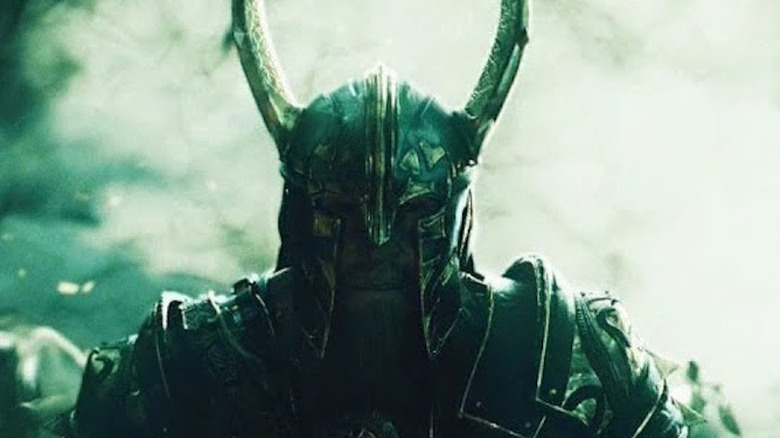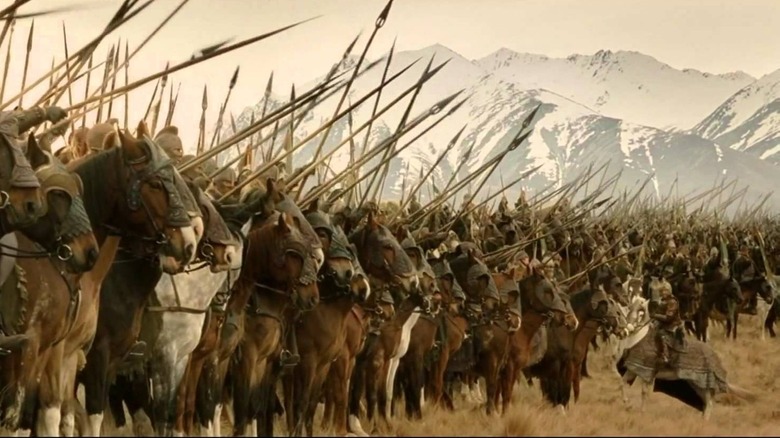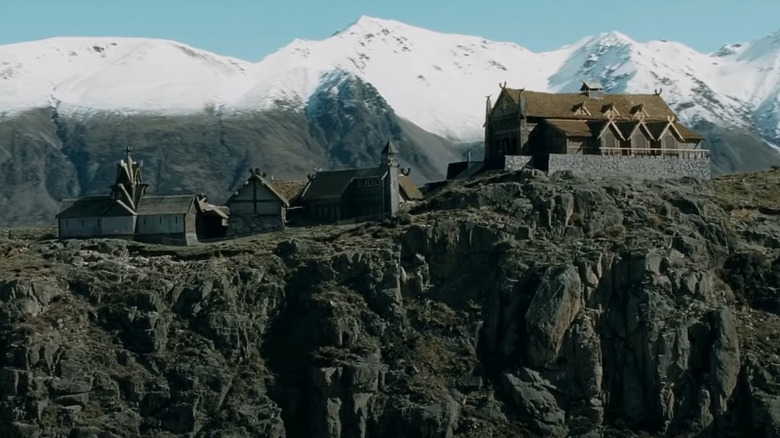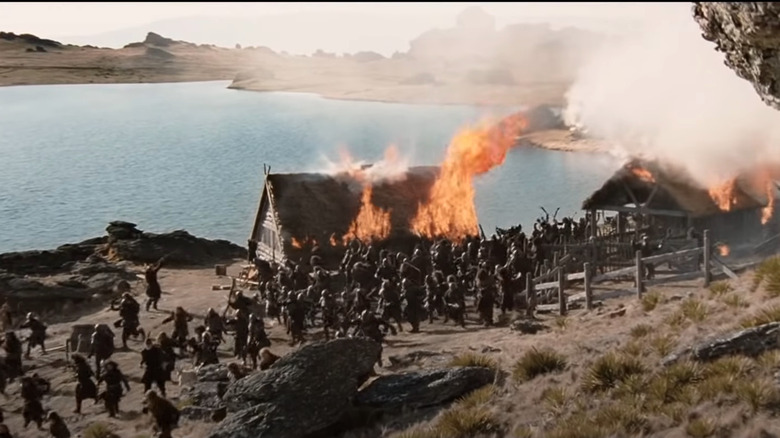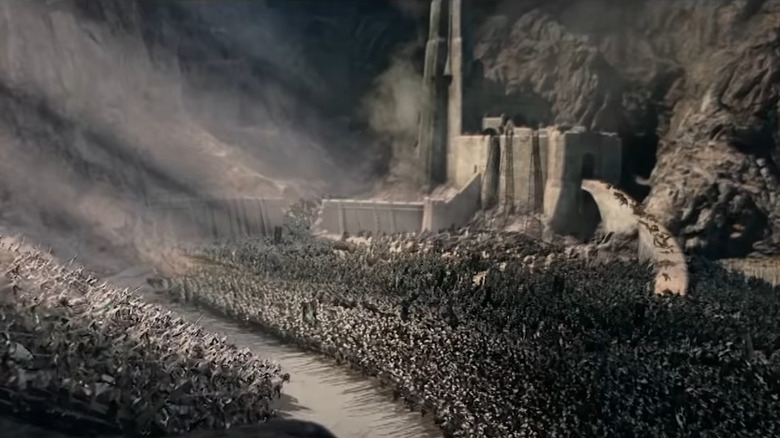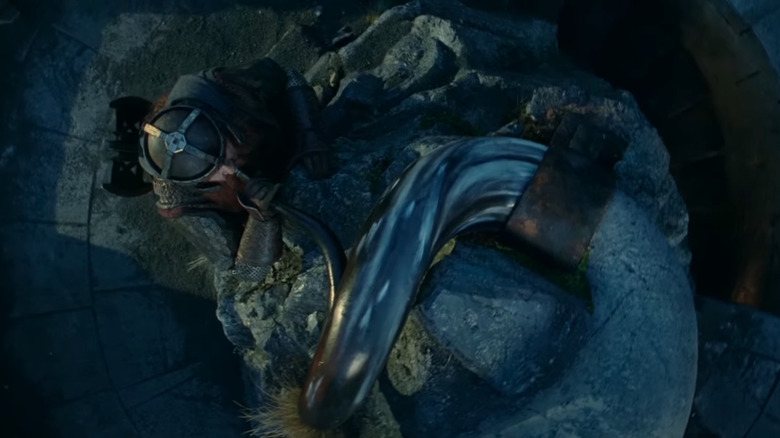Helm Hammerhand's Backstory Explained
Helm's Deep has always been an iconic piece of the Middle-earth legendarium. The epic battle fought in the Deep between the forces of Sauron and the dismounted Riders of Rohan captivated fans of the books for decades. Then, Peter Jackson took the climactic conflict and brought it to life on the silver screen, and the audience only grew from there.
Thus it was that when the news dropped that a Helm's Deep-focused animated film was in production, Tolkien fans everywhere rejoiced. The film promised to flesh out the background of the mighty mountain fortress and the man who gave the fastness its name, a powerhouse dude named Helm Hammerhand.
The story of Helm Hammerhand is in many ways one of the most legendary chapters that Tolkien ever wrote. True, it lacks the ancient depth that much of his other writings tend to lean on. After all, Helm lives just two and a half centuries before "The Lord of the Rings." In comparison, the Second Age, when Amazon's behemoth Middle-earth project takes place, starts 6,000 years earlier. And there are multiple ages and eras that come before that, as well.
Even so, Helm is a character steeped in his own mythology, however comparatively recent. King of the Mark, overzealous warrior, stubborn to a fault, fallen before his time, the rough-around-the-edges monarch is a case study in heroes that are anything but perfect. We decided to dive a bit deeper into the background of this mysterious Rohirric king to see what kind of backstory the new movie has to work with, and it turns out that the legend of Helm Hammerhand is one of the best self-contained little chapters in all of Middle-earth's long history.
Here it is in brief ... spoilers ahead!
Helm is a King of Rohan
The story of Helm can be found in the Appendix to "The Return of the King." In the addendum of the third volume of the "LOTR" trilogy, Tolkien takes a handful of pages to give us a brief history of Rohan. This starts with Eorl, the founder of the equine kingdom, who leads his people out of northeastern Middle-earth to save Gondor from an invasion. After this, the steward of Gondor gifts the saved region to the horse lords as a gigantic thank you for saving their skins.
Once Rohan is founded, Eorl's descendants continue to rule over the young kingdom, with one king following the next from father to son until the ninth king, Helm, takes over. We don't get much background on Helm's earlier years. Instead, Tolkien introduces him with the dramatic line "Of the Kings of the Mark between Eorl and Théoden most is said of Helm Hammerhand. He was a grim man of great strength."
From there, he launches into Helm's story, starting when the king is already middle-aged and busy ruling his sprawling kingdom. The fact that Helm doesn't get much of an introduction may be disappointing, but it's more than made up for by the rest of his over-the-top epic story — a narrative that starts with some warmongering discrimination.
See, Helm is a bit prejudiced against the neighbors of Rohan, a group called the Dunlendings. They were displaced when Rohan rolled into the region, and at this point, they mostly live north of the land, up away near an old Gondorian fortress called Isengard (and no, Saruman doesn't live there yet, although he shows up not long after Helm's story ends).
Anyway, Helm is not a fan of the Dunlendings, who have a long-standing beef with the Rohirrim who ousted them from their homes a few hundred years earlier. This sets the stage for the conflict that defines Helm's entire career.
Helm shows off his hammer of a hand
One of Helm's noblemen is a guy named Freca. Freca technically claims that he's related to one of the past kings of Rohan. However, it's also rumored that he has Dunlendish blood, a fact that makes the prejudiced Helm suspicious. It doesn't help that Freca also has a lot of land and his own stronghold, which makes him semi-autonomous. In "The Return of the King," Tolkien sums up the unpleasant relationship with the line, "Helm mistrusted [Freca], but called him to his councils; and he came when it pleased him."
At one point, Freca attends a council where he informs Helm that he wants the king's daughter to marry his son, Wulf. Helm is clearly insulted by the offer and tells his liegeman, "You have grown big since you were last here; but it is mostly fat, I guess." Freca gets angry, and choice words are spoken before the king tells Freca that they'll resolve the issue later. After the council, Helm takes Freca outside and picks a fight with the overweight aristocrat. The powerful loose-canon-of-a-king tells Freca that he refuses his offer, and then hauls off and punches the guy right in the face. The blow is so hard that Freca literally dies from it not long afterward, which, gee-whiz. Talk about some upper body strength.
Anyway, the hard-hitting monarch is unapologetic about the incident. In fact, Helm up and chases Wulf and the rest of Freca's followers out of the land, naming them enemies of the state in the process. So, yeah, Helm is kind of a jerk at this point. Sure, the old, griping issues with anyone from Dunland aren't really a surprise, but the king clearly is anything but diplomatic as he navigates the issue.
It isn't long before his Dunlendish chickens come home to roost.
War in Rohan
Four years after Helm's violent negotiation with Freca, both Rohan and Gondor are invaded by different enemies at the same time. Gondor is attacked by the Corsairs of Umbar, the same black ships that Aragorn and company intersect on their way to the Battle of the Pelennor Fields 250 years later. With Gondor already occupied, another army, this time a group of Easterlings, shows up and attacks Rohan from out of nowhere.
With no help coming from Gondor and their hands already full, Helm and his soldiers suddenly find themselves unexpectedly attacked by an army of Dunlendings, too. Their leader? Freca's son, Wulf. "The Return of the King" explains that in the ensuing fighting, "The Rohirrim were defeated and their land was overrun; and those who were not slain or enslaved fled to the dales of the mountains."
It also clarifies that Helm and his army are seriously whipped by the fighting and retreat to an old fortress in the mountains. This was originally built by the men of Gondor, who called it the Fortress of Aglarond. At this point, though, the Rohirrim own it, and they simply call it "Súthburg" which roughly — and uninspiringly — translates to "a fortress in the south of their land." While Helm's army is under siege, Wulf's men capture the capital city of Edoras and the Dundlending leader sets himself up in style on the king's throne in the Golden Hall — the same place where we first meet Théoden in "The Two Towers." Also of note, the last person to fall defending the doors of the Golden Hall is one of Helm's two sons, Haleth.
A long siege and a cold winter
The five months that follow the two-front invasion of Rohan are a frigid version of hell on Middle-earth for everyone involved. Their enemies roam the land at will, while the Rohirrim continue to hide in the mountains. Meanwhile, the king remains cooped up in his fortress, unable to do anything but hold on for dear life. Eventually, his other son, Háma, is also killed in the fighting, leaving him without a son to take his place. To make matters worse, this chunk of time goes down in history as the "Long Winter" — and yes, it's as bad as it sounds. The cold is extreme, and there is a severe shortage of food throughout the land. This affects both friend and foe alike, and everyone suffers.
The desperate king, probably feeling a bit remorseful for his impulsive fistfight with Freca at this point, swallows his pride and offers to surrender to his enemies ... just kidding. The stubborn, prideful, grief-stricken ruler refuses to give up, no matter how bad things get. Instead, he takes up the habit of wandering out from his fortress alone. Hungry and hopeless, he dresses in white and stalks around in the snowy weather "like a snow-troll into the camps of his enemies." There he kills anyone he can find — with his bare hands, which, yeah. Intense.
As the siege and the cold drag on, Helm does this over and over again. He blows his great horn before he goes out each time as if to give his enemies every possible chance of killing him. Instead, they run away until they know the seemingly demon-possessed king is back in his mountain home. This is where Helm makes hay as a semi-legendary figure. Stories start to sprout up that the king is invincible — particularly when he's fighting with his bare hands.
But it turns out that Helm's devastated antics do have an expiration date.
An epic ending
One night deep into the siege, Helm blows his horn and goes out a'hunting for some Dunlendish prey. This time, though, he doesn't come back. In the morning, the wintery clouds break for the first time in days, and the morning sun illuminates a frozen figure standing out in the snow. In "The Return of the King," Tolkien writes, "There stood Helm, dead as a stone, but his knees were unbent."
After Helm's death, the winter finally relents and the king's nephew, Fréaláf Hildeson, hatches a desperate plot that kills Wulf and drives his men out of the land. Gondor is also able to send help, and the land is finally freed from the grip of the invaders. Fréaláf starts a new offshoot line of kings — the same one that ends with Théoden — and Rohan's history carries on.
As for Helm, his legend only grows over the years. The fortress that he fiercely defended becomes known as Helm's Deep, and the fortress of Súthburg is referred to as the Hornburg thereafter. The Dunlendings create their own boogeyman stories in which they claim that Helm wasn't just an enemy but a cannibal that ate men in his hunger.
For the people of Rohan, they maintain the tradition that "the horn was still heard at times in the Deep" adding that "the wraith of Helm would walk among the foes of Rohan and kill men with fear." Helm's track record is anything but pristine, but it's the very rough-and-tumble nature of his tenure as a king of the Mark that makes his story so compelling. From bursts of violence and unquenchable pride to his prowess as a mighty warrior, the storied king leaves an indelible mark on his people that is still palpable when the War of the Ring starts, two-and-a-half centuries later.
